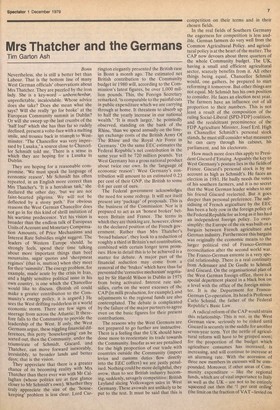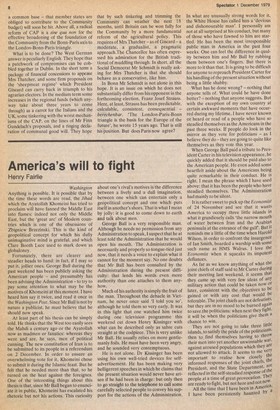Mrs Thatcher and the Germans
Tim Garton Ash
Bonn Nevertheless, she is still a better bet than Labour. That is the bottom line of many West German officials' observations about Mrs Thatcher. They are puzzled by the iron lady. She is a key-word — unberechenbar, unpredictable, incalculable. Whose advice does she take? Does she mean what she says? Will she really `go for broke' at the European Community summit in Dublin? Or will she sweep up the last crumbs of the 'half loaf' which she has thus far so rudely declined, present a volte-face with a melting smile, and trounce back in triumph to Westminster. 'The Chancellor was very impressed by Lusaka,' a source close to Chancellor Schmidt told me. There is a sense in which they are hoping for a Lusaka in Dublin.
They are hoping for a reasonable compromise. 'We must speak the language of economic reason', Mr Schmidt has often repeated, in an English more correct than Mrs Thatcher's. 'It is a herculean task,' she declared the other day, 'but we are not faint-hearted pilgrims. We will not be deflected by a stony path.' For obvious reasons the West German Chancellor does not go in for this kind of shrill imitation of his wartime predecessor. Yet his vision is broader than the endless talk of European Units of Account and Monetary Compensation Amounts, of Price Mechanisms and Interest Rate Subsidies might suggest. The leaders of Western Europe should, he strongly feels, spend their time talking about more important things than beef mountains, sugar quotas and `sheepmeat regimes' (that is, mutton) when they meet for their 'summits'. The energy problem, for example, made acute by the crisis in Iran, and a highly sensitive political issue in his own country, is one which the Chancellor would like to discuss. (British oil could make a greater contribution to the Community's energy policy, it is argued.) He sees the West drifting rudderless in a world economic storm. There are few signs of steerage from across the Atlantic. It therefore falls to the Community to provide the leadership of the West. If only, the West Germans argue, these niggling financial differences, this petty 'housekeeping' can be sorted out, then the Community, under the triumvirate of Schmidt, Giscard, and Thatcher, can move forward inexorably, irresistibly, to broader lands and better days; that is the vision.
They appreciate that there is a greater chance of its becoming reality with Mrs Thatcher than there ever was with Mr Callaghan (whose politics are at first glance closer to Mr Schmidt's own). Whether they truly appreciate the size of the 'housekeeping' problem is less clear. Lord Car rington elegantly presented the British case in Bonn a month ago. The estimated net British contribution to the Community budget in' 1980 will, according to the Commission's latest figures, be over 1,000 million pounds. This, the Foreign Secretary remarked, 'is comparable to the painful cuts in public expenditure which we are carrying through at home. It threatens to absorb up to half the yearly increase in our national wealth.' It is much larger,' he pointedly observed, standing on the bank of the Rhine, 'than we spend annually on the foreign exchange costs of the British Army Of The Rhine and the Royal Air Force in Germany.' On the same EEC estimates the Federal Republic's net contribution in the same year will be 720 million pounds. Yet West Germany has a gross national product about twice our own. In the 'language of economic reason': West Germany's contribution will amount to an estimated 0.23 per cent of their GNP, the British to some 0.6 per cent of ours. The Federal government acknowledges the need for some redress. It will not itself present any 'package' of proposals. This is the business of the Commission. Nor is it prepared to act as an 'honest broker' between Britain and France. The terms in which they are thinking are, however, closer to the declared position of the French government. Rather than Mrs Thatcher's 'broad balance', they look to a reduction of roughly a third in Britain's net contribution, combined with certain longer term promises. How in detail this is to be achieved is a matter for debate. A major part of the financial reduction may come from a removal of the 'brakes' which have thus far prevented the 'corrective mechanism' negotiated by Sir Harold Wilson in Dublin in 1975 from being activated. Interest rate subsidies, curbs on the worst excesses of the CAP (in milk production, for example), and adjustments to the regional funds are also contemplated. The debate is complicated by the failure of the major partners to agree even on the basic figures for their present contributions.
The reasons why the West Germans are not prepared to go further are instructive. There is a feeling that the UK should have done more to reorientate its trade towards the Community. Insofar as we are penalised for the high proportion of our trade with countries outside the Community (import levies and customs duties flow directly into the EEC coffers) we are justly penal ised. Nothing could be more delightful, they avow, than to see British industry becom ing, suddenly, savagely competitive: British Leyland slicing Volkswagen sales in West Germany. These avowals are unlikely to be put to the test. It must be said that this is competition on their terms and in their chosen fields.
In the real fields of Southern Germany the eagerness for competition is less audible. German farmers do very well from the Common Agricultural Policy, and agricultural policy is at the heart of the matter. The CAP now devours about three quarters of the whole Community budget. The UK, having a small and efficient agricultural sector, scarcely benefits from it. All other things being equal, Chancellor Schmidt would, one gathers, be prepared to start reforming it tomorrow. But other things are not equal. Mr Schmidt has his own position to consider. He faces an election next year. The farmers have an influence out of all proportion to their numbers. This is not least a result of the composition of the ruling Social-Liberal (SPD-FDP) coalition, and the recalcitrant preeminence of the FDP Agriculture Minister, Josef Ertl. High as Chancellor Schmidt's personal stock stands, he must still consider what measures he can carry through his cabinet, his parliament, and his electorate.
How much more does this apply to President Giscard d'Estaing. Arguably the key to West Germany's posture lies in the fields of France. Giscard's personal stock is by no account as high as Schmidt's. He faces an election in 1981. He badly needs the votes of his southern farmers, and it is no secret that the West German leader wishes to see his friend Giscard reelected. But it goes deeper than personal preference. The subsidising of French argiculture by the EEC has been a holy cow in the foreign policy of the Federal Republic for as long as it has had an independent foreign policy. 'I o oversimplify: the Europe of the six was built on a bargain between French agriculture and German industry. Furthermore this bargain was originally the economic means to the • larger political end of Franco-German reconciliation after the second world war. The Franco-German entente is a very special relationship. There is a real continuity from Adenauer and De Gaulle to Schmidt and Giscard. On the organisational plan of the West German foreign office, there is a special department placed in a black box on a level with the office of the foreign minister. It is the Department for FrancoGerman Co-operation. Its head is Professor Carlo Schmid, the father of the Federal Republic's Basic Law.
A radical reform of the CAP would strain this relationship, This is not, in the West German view, seriously to be risked until Giscard is securely in the saddle for another seven-year term. Yet the nettle of agricultural reform will have to be grasped soon; for the proportion of the budget which agriculture consumes has increased, is increasing, and will continue to increase at an alarming rate. With the accession of three new members its excesses will be compounded. Moreover, if other areas of Community expenditure — like the regional funds, which are of vital importance to Italy as well as the UK — are not to be entirely squeezed out then the '1 per cent ceiling' (the limit on the fraction of VAT—levied on a common base — that member states are obliged to contribute to the Community budget) will soon be hit. Above all, a radical reform of CAP is a sine qua non for the effective broadening of the foundation of the Community from the Bonn-Paris axis to the London-Bonn-Paris triangle.
What is to be done? The West German answer is peculiarly English. They hope that a patchwork of compromises can be cobbled together in Dublin. In the short term a package of financial concessions to appease Mrs Thatcher, and some firm proposals on the `sheepmeat regime' which President Giscard can carry back in triumph to his agrarian electors. In the medium term some increases in the regional funds (which anyway take about three years to come through) as a carrot for the Italians and the UK, some tinkering with the worst mechanisms of the CAP, on the lines of Mr Finn Gundelach's proposals, and a ringing declaration of communal good will. They hope that by such tinkering and trimming the Community can weather the next 18 months, until Britain can be won fully for the Community by a more fundamental reform of the agricultural policy. This requires of Mrs Thatcher — as of Giscard — a moderate, a gradualist, a pragmatic approach.The Chancellor has often expressed his admiration for the British traditional of muddling through. In short, all the Social Democrat Mr Schmidt is really asking for Mrs Thatcher is that she should behave as a conservative, like him.
In Bonn Mr Schmidt is not alone in this hope. It is an issue on which he does not substantially differ from his opponent in the forthcoming election, Franz Josef Strauss. Here, at least, Strauss has been predictable, calculable, consistent, consequential — berechenbar. 'The London-Paris-Bonn triangle is the basis for the Europe of the future', he wrote 15 years ago. That is still his position. But does Paris now agree?












































 Previous page
Previous page